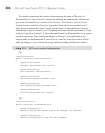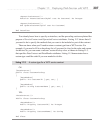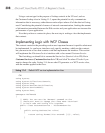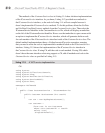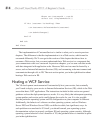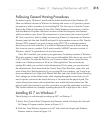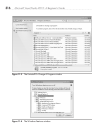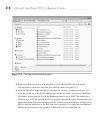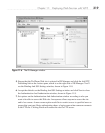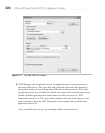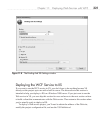
314 Microsoft Visual Studio 2010: A Beginner’s Guide
Where cst.CustomerID = custID
Select cst).SingleOrDefault()
If Not (customer Is Nothing) Then
ctx.Customers.DeleteOnSubmit(customer)
ctx.SubmitChanges()
End If
End Sub
End Class
The implementation of CustomerService is similar to what you’ve seen in previous
chapters. The difference is that the implementation is in a Web service, which must be
consumed differently. We’ll soon get to the section of this chapter that shows how to
consume a Web service, but you must understand that a Web service is a component that
you communicate with over a network. In previous chapters, you’ve seen code that works
with data integrated with application code. However, Web services must be hosted by a
server, such as Internet Information Services (IIS), and consuming code must connect and
communicate through calls to IIS. The next section points you in the right direction about
hosting a Web service in IIS.
Hosting a WCF Service
The VS development environment will automatically host your service, but eventually
you’ll need to deploy your service to Internet Information Services (IIS), which is the W
eb
server that hosts .NET applications. The instructions included in this section are general
guidance on how the deployment process works. It is very likely that subsequent operating
system patches and service packs could change the results for you. It is also possible
that the particular operating system and IIS configuration on your computer is different.
Additionally, the behavior of software on other operating systems, such as Windows
Server 2003 and Windows Server 2008, can differ in subtle, but significant, ways. As
such problems are unrelated to VS itself, you should consult your operating system
documentation on how to properly configure IIS and operating system security.
Although
operating system behavior is not a function of VS, the guidance below is intended to point
you in the right direction.



